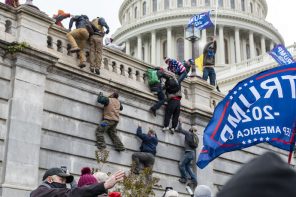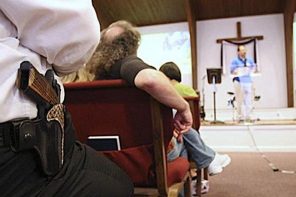The failed attempt by a would-be Nigerian terrorist to bring down a Delta aircraft over Detroit on Christmas Day must surely rank as the loudest non-explosion whose reverberations have quite literally been heard around the world. International travel over the next week was an adventure, to put it mildly. In Athens, everyone traveling to the United States was patted down and all carry-on items were unpacked and closely examined, without exception; travelers were not permitted to purchase liquids of any kind, even in the duty-free shops. These developments may soon become standard operating procedure.
Part of the story that has played out in the press has been a story of globalization, of the difficulty in articulating uniform security procedures in a diverse, however interconnected, international network. At American airports, travelers are forced to remove their shoes, as they have been ever since another failed attempt by Richard Reid to bring down an airplane plane with explosives demonstrated the potential dangers of shoes. Not so in Europe.
Debates about the potential violation of civil liberties posed by scanning machinery that provides imaging of a human body under its clothes seem destined to wind up in courts of law. For now, the U.S. seems more willing to countenance the use of such devices than the Europeans (with the notable exception of Italy)—the irony being that the Amsterdam airport possessed such machines but did not use them in this case.
Back home, the reactions have been predictable. On the security front, we will see more retroactive measures proposed to respond to what has just been attempted rather than to try to imagine what might happen next. That claim probably needs to be qualified, however, since in fact our security apparatus has long been organized against precisely an event of this kind.
Ever since Janet Neapolitano’s notorious pronouncement that “the system worked” on December 25, debates have swirled about what failed, about who failed, about who bears the responsibility for such failure, and what might be done about it. There will be full accountability, we have been reassured, though it is not clear what that means; if the failure was “systemic,” as everyone including the president insists that it was, then it is hard to know how to hold a system accountable. And we are now assured that there will be an entirely new Congressional review of our current security practices, fully eight years after the 9/11 attacks. The irony here is that we still have not fully implemented the recommendations of the 9/11 Commission made many years ago.
The politics of the thing are not complicated; they have been disappointing, if anything, for their very predictability. Hardline Republicans fault the administration for not taking the security threat seriously enough, and for being “soft on terror.” Hardline Democrats defend their president and his security team, and even attempted, briefly, to explain away Neapolitano’s flagrant and not-so-very-defensible verbal missteps.
Newt Gingrich proved to possess an interesting voice (and to be an effective counter-puncher) in all of this. He has been attempting to reinvent himself as a bipartisan teller of painful truths ever since he began working with the Reverend Al Sharpton on education reform. Now, Gingrich tells us, it is very clear that neither the previous administration nor the current one took the threat of terrorist attacks against the homeland seriously enough. Republican and Democrat, Bush and Obama, he opines, have cared more for the “rights of the terrorists” than they have “the right to life” of American citizens who fly.
That rights are in question is very much to the point; that the debate about rights cuts this way is debatable.
The rhetorical ploy, made convincing as much through the absence of any rhetorical alternative, has been to pose a stark dichotomous choice, then to fault people for making the wrong one. Heredefined by two concepts: liberty and security. And here yet again, we will be asked to sacrifice more of our civil liberties in the name of increased security… as if the sacrifices made under the aegis of the USA Patriot Act were not enough.
The Obama administration, with the notable exception of Vice President Biden, seems to be caving to the pressure of needing not to appear soft on terror and to appear especially firm on anti-terrorist security matters. So the president has elected to retrieve the very rhetoric from which he had so significantly distanced himself in the controversial decision to bring the alleged 9/11 masterminds to US soil to stand trial.
Recall the howls this generated from the right a couple of months ago. By renaming these men “criminals,” rather than as “terrorists,” the whole structure to be arrayed against them had shifted. No more indefinite imprisonment without charge. Gone were the military tribunals, to be replaced by civil courts. Now these former Guantanamo detainees were to have rights, legal counsel, the opportunity to make a defense, and to get a public hearing.
The administration’s very swift decisions to declare Umar Farouk Abdulmutallab an “enemy combatant” reverses this trend, and signals very clearly that, in the security arena at least—as in the economy—this administration dares not dream boldly.
We will be screened by full body scanners in the very near future at most US airports, and one can already imagine the inevitable security, and other, lapses this will create in the era of the internet. We also intend to engage in very frank and unapologetic profiling, based on country of origin, and at least implicitly, on religious affiliation.
Ping: liberty. Pong: security. In this case, pong trumps ping, and our diminished civil liberties will be further mortgaged to make the sale.
We know the reason why ping pong is not a good spectator sport. Among its elite practitioners, the ball moves so fast that the public eye can scarcely follow. That’s a metaphor for the current debate, I think. The president and his team, and the nation as a whole, are moving far too fast for a concerned citizenry to follow the ball.




